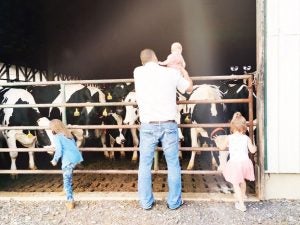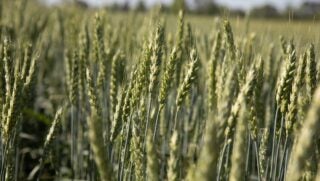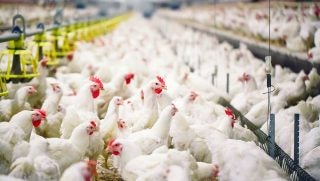First of all, I’m not a farmer. I’m a farmer’s wife, and I’ve only been a farmers wife for six years. So I’m not writing this from the perspective and standpoint of a farmer or someone who knows everything that there is to know about the industry, because I’m still learning. My viewpoint comes from the sidelines: I watch my husband have conversations on the topic. I listen when he tells me about what is going on. And I read fact-based and scientifically correct articles published by industry professionals, farmers, and scientists who know what they are talking about — the ones who live it and breathe it, every single day.
I once was a naive consumer standing in front of the dairy case at the supermarket studying all of the different types of milk, the ones that boasted their claims of being organic, grass-fed, antibiotic free (all milk, and I mean ALL MILK, is antibiotic free) and I, unfortunately, bought the prettiest bottle with the best sounding marketing campaign. It was all quite confusing at that time, but then plant-based “milk” exploded in the marketplace and people lost their darn minds. I mean, this must be heaven right?! The cartons were screaming in our faces that they were the healthier choice, the right choice, the “delicious difference” that we were all waiting on.
But generations of people were raised on whole dairy milk, a glass of milk with breakfast, lunch, and dinner — until one day someone somewhere said, “Hey, I think milk is bad for us, dairy farming is cruel, we should find an alternative.”

Now, I love a handful of crunchy almonds, and I kind of like coconut, but they’re not milk. They don’t create milk, they create a juice, a juice with less protein and less nutritional value than dairy. And, when you look at the market, dairy is still at the top, but the disconnect in information between the farmer and the consumer is driving people in hordes to switch to a dairy alternatives, which drives the need for dairy production down.
I’m sure you’ve seen very recently in the news or on your Facebook feed that there is a crisis in the dairy industry, a serious problem facing American farmers — especially our neighbors and friends right here in our own Lancaster County, Pennsylvania. Forty-four nearby and neighboring farmers received their 90-day notices and lost contracts recently. And, as soon as Facebook started asking people if they wanted to change their profile picture to state, “I support dairy farmers,” I started receiving numerous messages from friends and family wondering what was happening and if we were OK. Yes, we are all right. Milk prices are at record lows; there’s saturation, and with the supply of milk and a broken federal pricing system, things can look a little dark. But, thankfully by the grace of God, we are OK … for now. What will the dairy industry look like a year from now? Two years from now? Five years from now? We don’t know. My husband doesn’t know. Nobody knows, but anything can change for the good or bad (God willing, for the good).
So, friends, we are OK, for now.
But, many, many, other farmers and farm families are not OK. They are either getting milk contract termination letters causing them to have to sell their entire life’s work, their herd, their equipment, land, and homes, or the price of milk is simply driving them out of business. Currently, 97 percent of the U.S. dairy farms are family-owned, multigeneration operations that have seen many things happen in this industry from record low milk prices to record high prices like the ones we saw in 2014. We are now entering the fourth year of record low milk prices, and as the milk prices drop, the number of suicides seen in farmers is rising. Most are barely breaking even every month, and it’s not uncommon for a farm to carry a heavy debt load, especially when you try and keep your equipment up to date, your herd well-cared for, and your buildings in good working and safe order.

What is the answer? How do we turn the industry around? I don’t know. My farmer doesn’t know. His friends and colleagues do not know. Prayer? Hopefully. A boost in people actually purchasing milk and dairy? Possibly. A better conversation between farmer and consumer? Maybe.
With so many unknowns, all I can say is, go enjoy some dairy. Don’t be afraid of it. Have an extra piece of cheese, yogurt, ice cream — it all helps. And, if you really, really, really are against consuming dairy products, then just simply thank a farmer. They are proud people. They are proud of their accomplishments, the operations that they have built, their work, and their livelihoods. They put in tireless hours cultivating and producing a quality product for you. Lastly, pray for the industry as a whole (if you are the praying kind). Pray for the suicide numbers to drop, for these farmers to feel like there is another way, and for all of the families who are affected and who will be affected if things don’t turn around soon.
Tiffany Hess is married to a third-generation dairy farmer and blogs on the site Three Girls and a Farm. She is currently a stay-at-home mom to her three young daughters, determined to live a full and simple life with a family of five.


